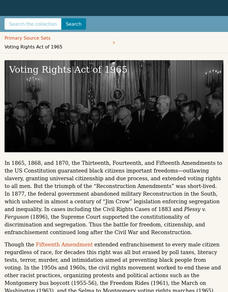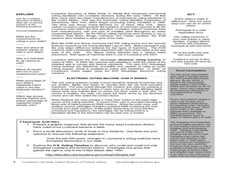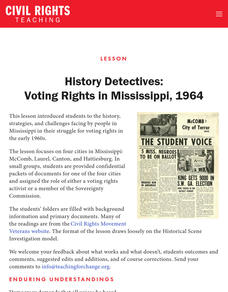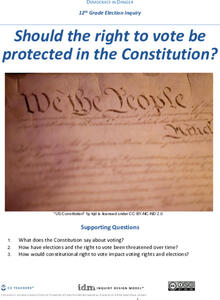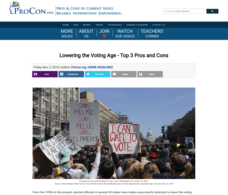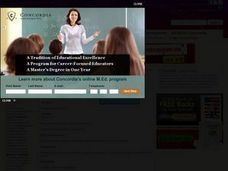Digital Public Library of America
Voting Rights Act of 1965
Despite the passing of the Thirteenth, Fourteenth, and Fifteenth Amendments, as well as the passing of the Voting Rights Act of 1965, the struggle to ensure fair voter registration and election procedures continues. Young historians...
Carolina K-12
Compulsory Voting
Should voting in the United States be compulsory? In 2004, fewer than 60 percent of eligible voters cast ballots in the American national elections. After reviewing arguments for and against compulsory voting, your young citizens will...
ProCon
Voting Machines
Does technology always mean advancement? Scholars take a close look at the use of voting machines. Does using a machine make voting more effective? Readers consider the advantages and disadvantages of the current voting process. They...
Classroom Law Project
What does the Constitution say about voting? Constitutional Amendments and the Electoral College
As part of a study of voting rights in the US, class members examine Constitutional amendments connected with voting and the role of the Electoral College in the election process.
Carolina K-12
Get Out the Vote!
What better way to have a class learn about get out the vote campaigns than by having them create one themselves? After introducing get out the vote efforts and why they exist through videos, articles, and discussion questions, the...
Close Up Foundation
Teach the Vote
Why is voting important? A social studies unit presents a non-partisan approach to the importance of voting, to voting laws and procedures, and to resources that voters need to become informed voters.
Mikva Challenge
Why Vote?
Elections are supposed to represent the will of the people. So why don't 100% of registered voters line up at the polls on Election Day? High schoolers study the last few elections and the voter turnout for each, according to race,...
C-SPAN
Should States Shift to Mail-In Voting during the Coronavirus Pandemic?
With the coronavirus pausing many norms in American society, officials are trying to decide how to safely hold voting in the 2020 presidential election. Using curated video clips, including speeches from Congress, journalists, and...
C-SPAN
Voting Discrimination and the Effects of Shelby County v. Holder
Show young scholars that every vote counts as they debate the federal government 's role in protecting voting rights in historically racially discriminated areas. In the Supreme Court case Shelby County v. Holder, the high court found...
Curated OER
How We Vote
Students fill in a graphic organizer and discuss the struggles in groups about the history of voting in Louisiana. Students also explore a voting timeline to see who could and could not vote before and after 1850.
Curated OER
Race and Voting in the Segregated South
High schoolers examine the history of African American voting rights. In this voting rights lesson, students listen to a lecture on African American voting rights between the years 1890 and 1965. High schoolers respond to discussion...
Carolina K-12
The Results are In! Examining Our First Vote Election
The 2016 election is over, and now it's time to dig in to some data! An activity revolves around data gathered from the First Vote Project in North Carolina wherein thousands of students voted. After diving in to the data using provided...
Curated OER
Validating Votes
Explore the discrepancies in Florida's vote counting process in 2000 and 2002 with this New York Times reading lesson. Middle schoolers study the viewpoints presented in informational text, paying attention to how word choice can...
Teaching for Change
History Detectives: Voting Rights in Mississippi, 1964
Promises made and promise broken. Spies and activists. Voting rights in Mississippi are the focus of a lesson that has class members research the history of the struggle in Mississippi. Learners take on the role of voting rights...
K20 LEARN
LBJ and Voting Rights
Challenges to voting rights is not a new thing. Using President Lyndon B. Johnson's 1965 "The American Promise" speech on voting rights as a starting point, young historians research current voting rights laws and challenges.
Curated OER
Who Can Vote? Chart
Students become familiar with historic and contemporary issues connected to voting rights around the world. They research the voting rights history of their country and then compare information about voting rights in at least three...
C3 Teachers
Democracy in Danger: Should the Right to Vote Be Protected in the Constitution?
High school seniors investigate what national, state and local rules say about voting. After examining the Constitution's articles, clauses, and amendments, researchers look at videos, listen to podcasts, and read articles to gather...
ProCon
Voting Age
Should age matter when it comes to voting? Scholars read an article discussing the pros and cons of lowering the voting age to 16. They then consider both the advantages and disadvantages of having younger voters. After thinking about...
Facing History and Ourselves
The Audacity of a Vote: Susan B. Anthony’s Arrest
Susan B. Anthony's speech "Is It a Crime for Women to Vote?" takes center stage in a lesson that asks class members to consider how they might respond to what they consider an unjust law. Groups work through the speech paragraph by...
Curated OER
ONE VOTE
In order to understand the political process and the importance of voting, pupils will construct a class time line. They will group up and research a specific era, creating a time line of political events where one vote made a...
Curated OER
Voting Simulation
Students explore the process of voting. They study the lawmaking branch of the state government.
Curated OER
Your Vote Counts!
Students build an election campaign around their favorite TV characters. They acquire knowledge about candidates, slogans, qualifications, and voting using the activities in this lesson. Thus, they simulate the election process.
Curated OER
Early Voting, Other Election Changes are Possible
Pupils use the internet and linked sites to explore current voting methods in their community. They research suggestions that have been made for changes and interview people who made these suggestions (when possible). Students suggest...
Curated OER
Special Interests: How Would A Legislator Vote?
Students act as elected officials who must make decisions that will make someone unhappy. They consider five bills that are up for vote in light of the contributions that many special-interest groups made to their campaigns. Students...
Other popular searches
- Voting Age
- Voting for President
- Voting and Elections
- Voting Rights
- Voting Process
- Voting Ballot Template
- Presidential Election Voting
- Voting Records
- History of Voting
- Voting Habits
- Voting Rights Movement
- Voting and Democracy


